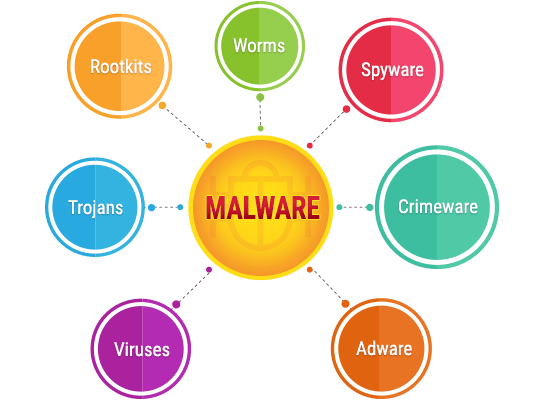The term malware is everywhere these days, but what exactly is it?
Malware is short for malicious software. It can be used to manipulate your computer and steal your information. There are several types of malicious software, which can be broken down into broad categories, including viruses, worms, and Trojan horses, among others.
Understand Important Types of Malware
- Viruses – Just as a biological virus enters your body and infects healthy cells, a computer virus is a program that infects your computer and can damage your data and files. Viruses can replicate themselves and are dangerous because they can make changes or delete files, including ones that contain sensitive information. Viruses can get into your computer system through an image attachment, a video or an audio file, or a download from the internet.
- Worms – Worms are malicious programs that make copies of themselves over and over again wherever they can, whether it’s on your local hard drive or a shared network. Worms don’t need to be attached to a program like a virus — they spread by exploiting vulnerabilities in operating systems. They take up a lot of space on your computer, which can make it very slow.
- Trojan Horses – Unlike viruses and worms, Trojan horses don’t make copies of themselves. A Trojan is a destructive program that looks like a genuine application, and once installed on your computer, can be extremely damaging. Like the myth after which this type of malware is named, Trojan horses open a back door to your computer, giving malicious users or programs access to your system, allowing them to steal your confidential and personal information.

Protect Your Computer from Malware
To protect against viruses, worms, Trojan horses, and other malware, it is important to use an up-to-date anti-virus/anti-malware program. However, these aren’t perfect, and sometimes malware can sneak through undetected, especially if it’s newly created. The best defense is to:
- Keep your computer updated with the latest patches, including those for applications like Java and Adobe products.
- Back up important files in an external hard drive, preferably an encrypted one.
- Avoid downloading unfamiliar toolbars or programs.
- Never open attachments from emails you don’t recognize.
- Use unique passwords on every website.
If you want a trusted partner to worry about your technology so you don’t have to, contact Chipin Hassle Free IT Solutions today.





